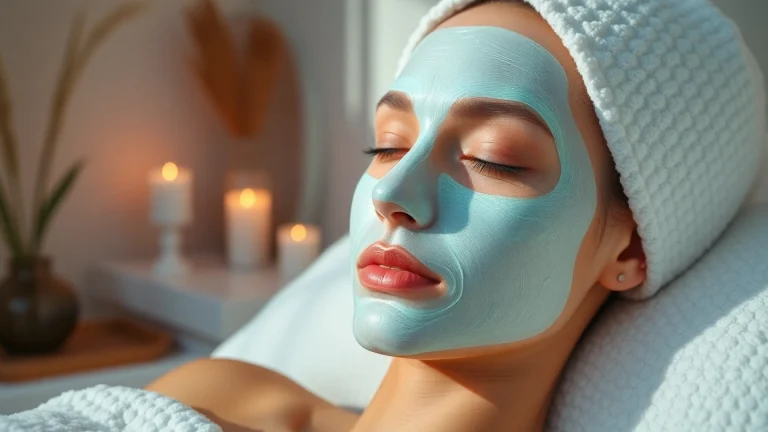
Revitalize Your Skin: The Essential Guide to Choosing the Best Facial Mask
Understanding Facial Masks: Types and Benefits
Facial masks have become an essential part of many skincare routines, offering targeted solutions that pamper the skin and address various concerns. From hydrating dry skin to fighting acne, there is a facial mask tailored for every need. If you’re looking to enhance your skincare experience, understanding the different types of masks available and their benefits is crucial. Whether you use a store-bought product or a facial mask created from natural ingredients, incorporating masks into your regimen can significantly improve your skin’s health.
The Different Types of Facial Masks
Facial masks come in various forms, each with its unique purpose and formulation. Here are some of the most common types:
- Clay Masks: Ideal for oily and acne-prone skin, clay masks absorb excess oil and detoxify the skin. Common clays used include bentonite and kaolin.
- Cream Masks: These are typically richer and more hydrating, making them perfect for dry or sensitive skin. They often contain emollients and nourishing ingredients.
- Sheet Masks: Pre-soaked in serums, these one-time-use masks deliver concentrated ingredients directly to the skin. They are great for a quick hydration boost.
- Gel Masks: Light and refreshing, gel masks are perfect for soothing and cooling the skin while providing hydration.
- Exfoliating Masks: Usually containing alpha-hydroxy acids (AHAs) or beta-hydroxy acids (BHAs), these masks help remove dead skin cells and promote cell turnover.
Key Ingredients to Look For in a Facial Mask
When selecting a facial mask, pay close attention to the ingredients, as they dictate the effectiveness of the mask. Here are some beneficial ingredients to consider:
- Hyaluronic Acid: Great for hydration, this ingredient helps retain moisture in the skin, making it plump and supple.
- Salicylic Acid: Ideal for acne-prone skin, this ingredient helps penetrate pores to unclog them and reduce breakouts.
- Glycolic Acid: An exfoliant that helps with skin texture and clarity, it promotes cell turnover for a brighter complexion.
- Aloe Vera: Known for its soothing properties, aloe vera is ideal for calming irritated or sunburned skin.
- Vitamin C: An antioxidant that brightens the skin and promotes an even skin tone while fighting free radicals.
Benefits of Regular Facial Mask Usage
Incorporating facial masks into your skincare routine can yield multiple benefits, such as:
- Enhanced Hydration: Masks can provide a boost of hydration, especially vital in dry environments or for dry skin types.
- Targeted Treatment: Whether dealing with acne, fine lines, or dullness, masks can serve specific challenges.
- Improved Skin Texture: Regular use of masks can lead to a smoother complexion by addressing rough patches, providing exfoliation, and moisturizing.
- Relaxation and Self-Care: The ritual of applying a facial mask promotes relaxation and self-care, contributing to overall mental well-being.
Choosing the Right Facial Mask for Your Skin Type
Identifying Your Skin Type
The first step in selecting the right facial mask is to identify your skin type. Here are the main categories:
- Oily Skin: Skin appears shiny, prone to acne and large pores.
- Dry Skin: Skin feels tight, flaky, or rough, often requiring extra hydration.
- Combination Skin: Oily in some areas (like the T-zone) and dry in others.
- Sensitive Skin: Prone to redness or irritation, this skin type needs gentle products.
Understanding your skin type will help in choosing a mask that caters specifically to your needs.
Facial Masks for Oily and Acne-Prone Skin
If you struggle with oily skin or frequent breakouts, masks containing clay, charcoal, or salicylic acid can be particularly effective. Here are some options:
- Clay Masks: Absorb excess oil and help reduce the appearance of pores.
- Charcoal Masks: Known for their detoxifying properties, they draw out impurities from the skin.
- Exfoliating Masks: Containing AHAs or BHAs to help reduce breakouts and promote clearer skin.
Best Facial Masks for Dry and Sensitive Skin
For those with dry or sensitive skin, look for masks that are hydrating, soothing, and enriched with nutrients. Options include:
- Cream Masks: Thick, nourishing formulations that restore moisture.
- Sheet Masks: Often soaked in hydrating serums that deliver moisture quickly and effectively.
- Gel Masks: Light and refreshing, perfect for soothing irritation or redness.
DIY Facial Masks: Natural Ingredients You Can Use at Home
Simple Recipes for Hydrating Facial Masks
Creating your own facial masks at home is not only cost-effective but also allows you to control the ingredients. Here are two easy hydrating mask recipes:
- Avocado & Honey Mask: Mash half an avocado and mix it with one tablespoon of honey. Apply for 15-20 minutes and rinse off for deeply hydrated skin.
- Yogurt & Oat Mask: Mix two tablespoons of plain yogurt with one tablespoon of finely ground oats. Apply for 15 minutes to nourish dry skin.
Exfoliating and Brightening DIY Facial Masks
Brightening and exfoliating masks can help improve skin texture and tone. Consider these recipes:
- Honey & Lemon Mask: Mix one tablespoon of honey with the juice of half a lemon. Leave it on for 10 minutes to brighten dull skin.
- Sugar & Olive Oil Scrub: Combine one tablespoon of sugar with one tablespoon of olive oil to create a gentle scrub. Massage onto the face and then rinse off for smooth skin.
Safety Tips for Homemade Facial Masks
While DIY masks can be beneficial, it’s important to keep safety in mind:
- Conduct a patch test to avoid allergic reactions.
- Avoid using highly acidic ingredients like lemon if you have sensitive skin.
- Store any leftover mask in the refrigerator, and use it within a few days to maintain freshness.
How to Apply and Maximize the Effects of Facial Masks
Step-by-Step Guide to Applying a Facial Mask
To achieve the best results from your facial mask, proper application is key. Follow these steps:
- Cleanse Your Face: Start with a clean canvas by washing your face with a suitable cleanser.
- Exfoliate (optional): If using an exfoliating mask, consider exfoliating before applying for better penetration.
- Apply the Mask: Use a brush or your fingers to apply an even layer, avoiding sensitive areas like around the eyes.
- Relax: Allow the mask to sit for the recommended time, usually between 10-20 minutes.
- Rinse Off: Use lukewarm water to rinse off the mask thoroughly, followed by a gentle pat dry with a clean towel.
Timing and Frequency: How Often to Use Facial Masks
The frequency of mask application depends on your skin type and the mask’s formulation:
- Oily or Acne-Prone Skin: 1-2 times a week for clarifying masks.
- Dry or Sensitive Skin: Once a week is generally adequate for hydrating masks.
- Normal Skin: Depending on the individual’s needs, 1-3 times a week can be optimal.
Post-Mask Care to Enhance Skincare Routine
After a mask application, follow up with your regular skincare routine to lock in moisture and nourish your skin:
- Apply a toner to refresh the skin.
- Use a serum targeted at your skin concerns.
- Finish with a moisturizer to seal in moisture.
Top Facial Masks on the Market: Reviews and Recommendations
Best-Selling Facial Masks and Their Features
As the market for facial masks continues to grow, several products stand out for their effectiveness and popularity. Here are notable mentions:
- Aztec Secret Indian Healing Clay: A powerful clay mask known for detoxifying and deep cleansing the skin.
- Dr. Jart+ Dermask Water Jet Vital Hydra Solution: A highly hydrating sheet mask that delivers intense moisture.
- Lancome Masque Énergie de Vie: A gel mask that brightens the skin while providing hydration.
Budget-Friendly vs. Luxury Facial Masks
Facial masks are available across a wide price range. Here are some recommendations:
- Budget-Friendly: Look for brands like Freeman or The Ordinary that offer great masks at accessible prices.
- Luxury: High-end brands like SK-II or Tatcha provide luxurious formulations often packed with premium ingredients.
User Reviews: What to Look For
When selecting a mask, consider user reviews to gauge effectiveness and potential reactions. Look for:
- Common complaints about irritation or breakouts.
- Positive feedback regarding hydration and overall skin improvement.
- Recommendations for specific skin types to ensure compatibility.


